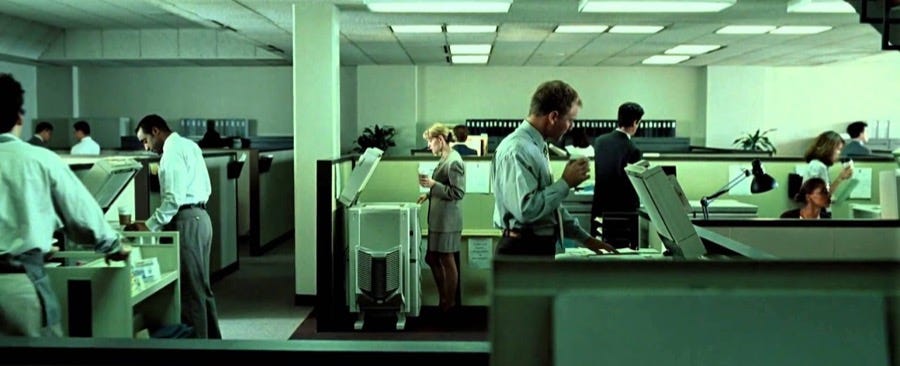Why do we work?
When life was a lot tougher than today, the reason for having a partner and children was to stay alive. Your family were free labour which increased your survival odds. That all changed with the Industrial Revolution. Technology made life easy so the reason for getting married and having children changed. That reason became love.
Work also used to be about survival, however, if you stop work today your survival chances are barely impacted. So just like marriage and children, the reason for why we work became love.
"Choose a job you love, and you will never have to work a day in your life."
Today we're brainwashed to believe that work is about passion but the overwhelming majority of us do not love work. It's a bore, it's a chore and "hate" is a more accurate way to describe the mind-numbing nonsense most of us have to put up with.
What is work?
The words work and job are used interchangeably, however, cooking, DIY and parenting are all work but not a job. My mundane office job is classified as work but ultimately it's a job. Jobs pay money while work often doesn't.
This may seem like semantics but distinguishing the two is useful. With a clearer definition of what work is (i.e. not our job), it's easier to answer "why do we work?".
The reason we work
"A good life is a progressive expansion of the things that bring you pleasure and include pleasure through motivation and hard work". This is a quote from the neuroscientist Andrew Huberman.
Huberman believes that hard work makes up a good life and I wholeheartedly agree. Most people feel better after a day of productive work; painting a spare room or doing some gardening vs lounging on the sofa all day.
It's logical from an evolutionary perspective why we feel good after hard work, there needs to be a neurochemical reward to hunt, gather berries and build shelter.
However, technology has made our lives progressively easier and with such little work to do we've made stuff up, it's called exercise and why we go to the gym.
Using Google's Ngram there are no surprises to learn that the popularity of the word "gym" only came about recently. The idea of paying to work-out would be a ridiculous concept to many prior generations.

With technology doing more of the work it should make life better, but does it? There's no longer a need to step outside as everything will be delivered to your door. Stream a film instantly instead of walking to the cinema or stay in a virtual world of video games, Instagram and Facebook all from the comfort of your living room. Is this really luxury?
When we compare ourselves to past generations it's hard not to think we are the lucky ones with all of our modern-day conveniences doing the work. There's less work do with every decade that passes, so we should be on a path to a utopia but we're clearly not.
Imagine for a moment a future world where there's no work. You wake up in the morning and technology washes, clothes and spoon feeds you breakfast. In this future world, robots take care of your children, there's not a single chore to do. This appears to be the direction we're heading in because "work = bad". But work is what gives us purpose, work makes us feel good and work is part of living a good life. Jobs on the other hand are a different story.
Why we have jobs
Our prehistoric relatives had one primary resource to accumulate: food. Thankfully food scarcity has been resolved, today, there's an unlimited number of alternatives to accumulate in exchange for the one resource we accumulate: money. Needless to say, these resources have no relationship to our survival.
Our appetite for accumulation cannot be satisfied. This can be perceived as greed or at best a misguided effort to achieve happiness through the consumption of goods and services. We're running software that served us well as hunter-gathers but it's no longer appropriate today.
The goods and services we strive to accumulate from our money paying jobs are dictated by social pressure (FOMO/jealousy) and media brainwashing. The media is used by governments to influence our opinions and by corporations to influence our consumption.
Hitler used the radio to brainwash, while today, corporations and governments have it easier with the internet. The more media we consume the more we are influenced.
We have jobs to earn money to buy the things we're subconsciously told to. Or as Tyler Durden put it "We buy things we don't need, to impress people we don't like".
Are you the weirdo?
Those that go off-grid, live in a camper van and opt-out of society are considered the strange ones. They're certainly in the minority so it's fair to say it's not normal. However, choosing not to be force-fed a life of 9-5 drudgery and opting to spend more of life living is maybe the less strange option to take.
Everywhere we look we are told that money is the most important ingredient of life. Which means working longer and harder at the jobs we hate. This becomes a paradox that is captured elegantly in the fisherman and businessman allegory.
Summary
We're now part of the 3rd Industrial Revolution. With every iteration, technology does more of the work, jobs become easier but at the cost of being boring. We all have easier lives compared to people of the past, but an easy life shouldn't be mistaken for a good one.
I enjoy work (we all do), it took me a while to realise that. It's the terrible jobs in society that I (and many) cannot tolerate.


